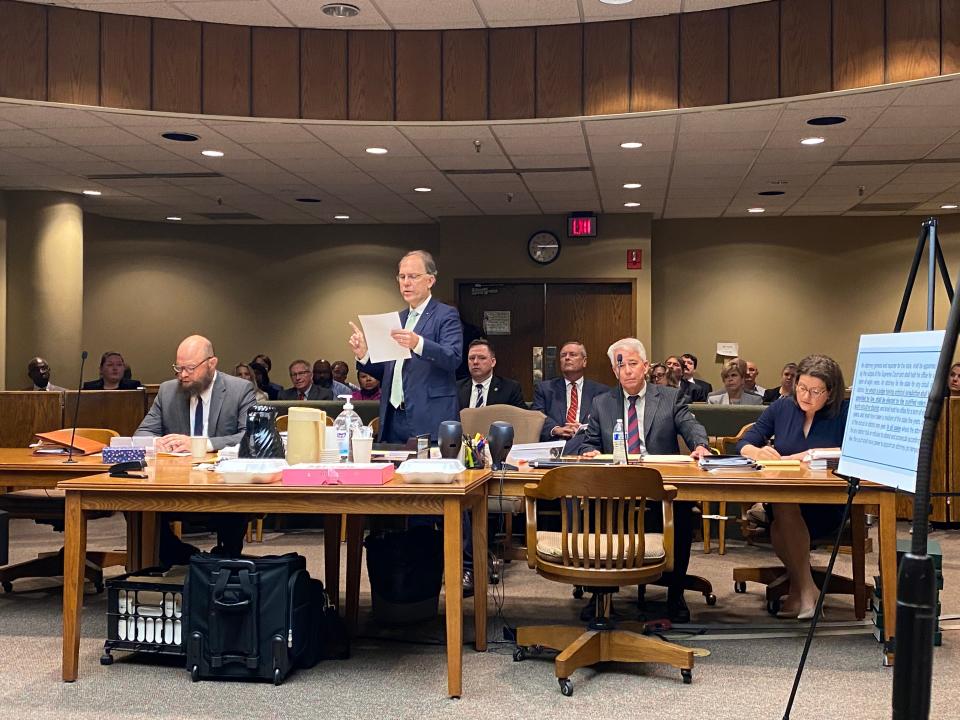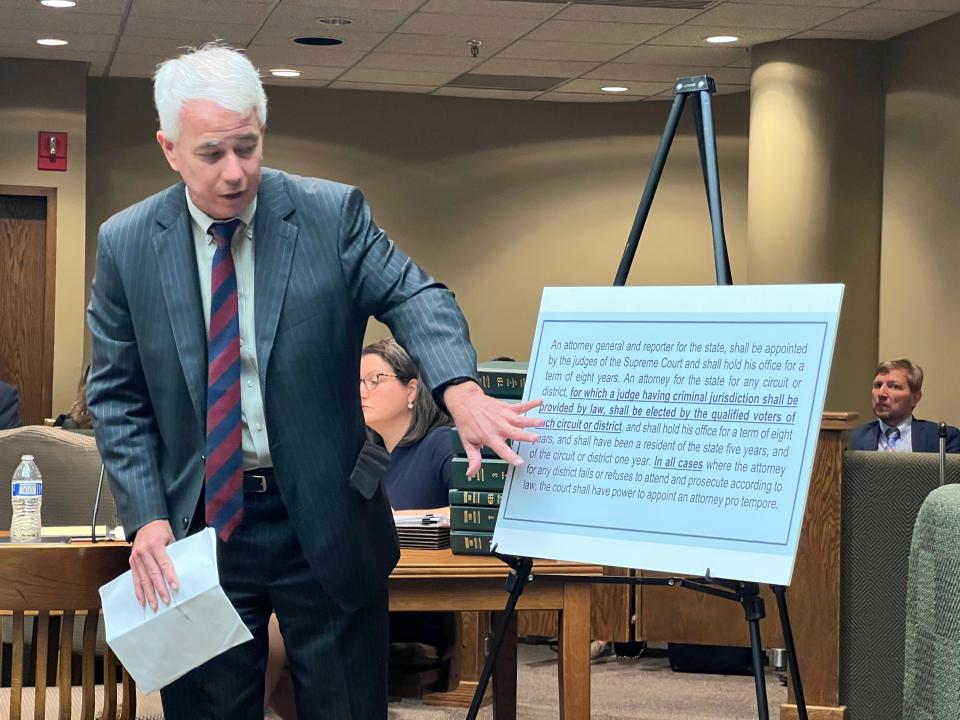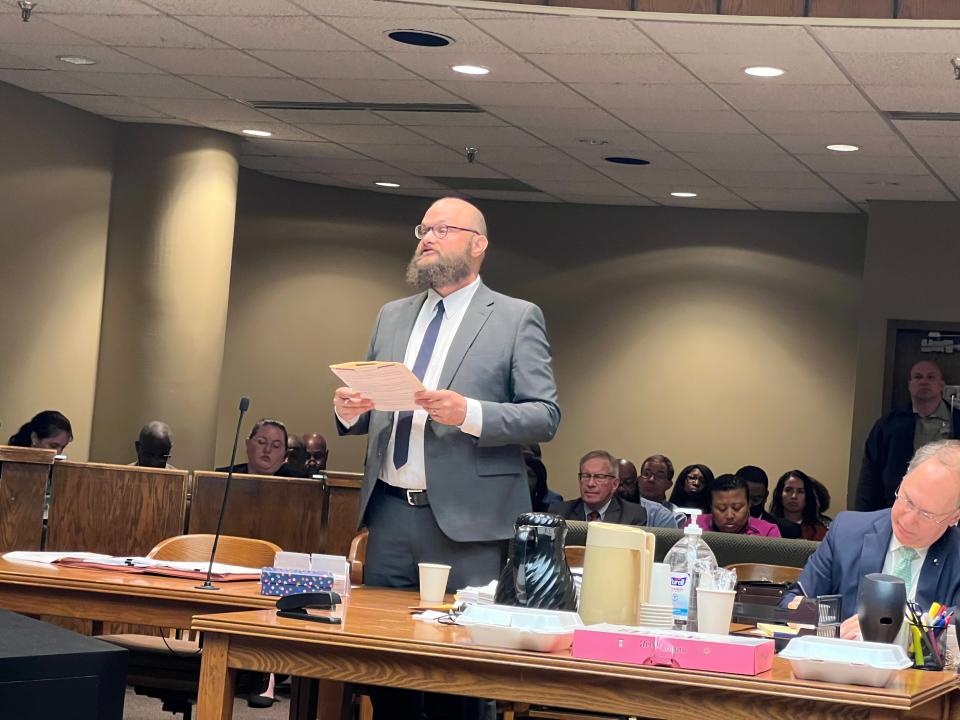Ruling on AG's involvement in some death penalty postconviction motions to come by mid-July
Shelby County Criminal Court Judge Paula Skahan will rule by mid July on whether the Tennessee Attorney General will be allowed to prosecute postconviction collateral reviews in death penalty cases, she said after Friday morning's hearing on a motion to disqualify the state AG from the case of a Memphis man on death row.
The motion was filed by attorney Robert Hutton — who is representing Larry McKay, who is currently facing the death penalty — just over a month ago, and Shelby County District Attorney Steve Mulroy signed onto and adopted the motion the same day.
The motion asks Skahan, who sits on the Division I bench in Shelby County's criminal court where McKay was convicted more than four decades ago, to disqualify the AG's office from the case. The AG's office began taking over these types of cases, often referred to as collateral review or coram nobis proceedings, after Gov. Bill Lee signed legislation into law on April 28 of this year.

The motion was argued by Mulroy himself, delivering his first arguments since winning his office, alongside Hutton. Nicholas Spangler, the deputy attorney general of the Criminal Appeals Division at the Tennessee AG's Office, argued on behalf of the State of Tennessee.
After the arguments were heard, Mulroy told reporters that multiple other district attorneys across the state have expressed concern over the new law. Davidson County District Attorney Glen Funk and District 28 District Attorney Frederick Agee attended the hearing, though they did not take part in arguments.
"There are other district attorneys, besides the two that drove all the way over here to attend this argument, that have also expressed concern, and I've been consulting with them," Mulroy said. "I have had conversations with members of the DA Conference about this. They also were very concerned. They haven't made any final decisions yet, but everyone is watching this case very closely because all 32 locally elected DAs from around the state, whether you're in a red part of the state or a blue part of the state, all of them are having their power stripped away and given to somebody who is in Nashville and is unelected."

Arguments from Hutton and Mulroy centered around the constitutionality of taking coram nobis proceedings, which happen in the jurisdiction the initial conviction occurred in, out of the hands of the locally elected district attorney. In their interpretation of the state constitution, which they argued was reading the text plainly as well as with historical context, a DA has the sole power to prosecute cases in their own jurisdictions.
"We're contending that, under the Tennessee Constitution, the prosecutor has to be elected, just like the judges have to be elected, by the local people and be accountable to the local people, and that there are certain things the legislature can't do," Hutton told reporters after the hearing. "One of the things they can't do is say, 'The constitution says the prosecutor and judge have to be elected,' then say, 'Well, no. Going forward, we're going to have appointed judges. We're going to appoint prosecutors.' That was all actually rejected by our state back in 1853."
Previous coverage: Shelby Co. DA joins effort to stop state AG from taking control of post-conviction death penalty cases
Mulroy also contended that if the state legislature could take away a district attorney's power to prosecute coram nobis cases, they could take away any power from local DAs. When asked if that was a slippery slope argument, he said the motions filed by his office and Hutton are a line in the sand.
"This is an extremely important issue because if the legislature can do this — if it can strip this power over life and death decisions from the local elected district attorney — then it can do anything," he said. "...If past is prologue, we know that once the legislature is given this much power, then it's only a matter of time before they take more power. We have to draw the line here."
Spangler, for the state AG's office, argued that Hutton did not have standing to file the motion to disqualify the Tennessee AG's Office from McKay's coram nobis proceeding since there was no provable harm that would come from Spangler's office prosecuting the case.
"McKay lacks standing to challenge the [law], and in any event, the [law] does not violate any provision of the Tennessee Constitution," Spangler said in court arguments. "Mr. McKay lacks standing to challenge this [law] because he can't point to any specific injury stemming from it...McKay doesn't even allege that the AG's representation of the state in this matter will have any different outcome in his underlying coram nobis proceedings."

Following two more filings in the case — a brief from the AG's office responding to Mulroy's argument that the law violates the voting rights of those who elected him by stripping power from the district attorney's office and Mulroy's response to the state's brief — Skahan said she would have a ruling by July 17.
If Skahan were to rule in favor of Hutton and the DA's motion, the attorney general's office would be removed from the case and not allowed to participate in the coram nobis proceedings. The attorney general could appeal the ruling to the Tennessee Court of Criminal Appeals. From there, the law's fate could be appealed again, and ultimately be decided by the Tennessee Supreme Court.
The law was originally introduced as a bill to target rape-kit backlogs, but a later amendment stripped language referencing rape-kit testing and rewrote the bill to take away local district attorneys' ability to litigate coram nobis petitions for death penalty cases.
Friday's hearing came about when Hutton filed a petition for a writ of coram nobis March 30 of this year, which asserts that McKay was not granted due process in his original trial due to faulty ballistics evidence, noting other potential suspects and saying the original prosecutors in the case misled the jury by claiming that ballistics evidence had no margin of error.
It was filed nearly a month before Gov. Bill Lee signed the bill on April 28, removing the district attorney from litigating the petition. Hutton filed the motion opposing the law the following Monday.
Lucas Finton is a criminal justice reporter with The Commercial Appeal. He can be reached at Lucas.Finton@commercialappeal.com and followed on Twitter @LucasFinton.
This article originally appeared on Memphis Commercial Appeal: Judge to rule on AG's involvement in death penalty postconviction by July

